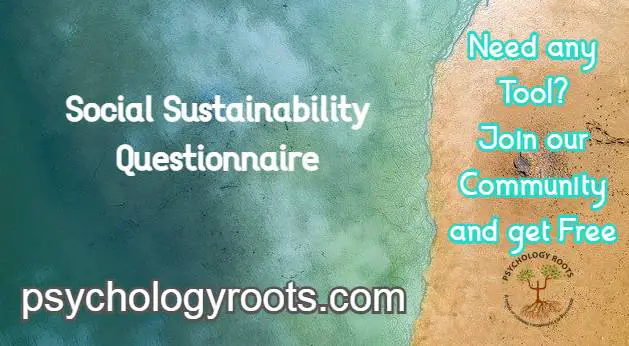Table of Contents
Social Sustainability Questionnaire
Here in this post, we are sharing the “Social Sustainability Questionnaire”. You can read psychometric and Author information. We have thousands of Scales and questionnaires in our collection (See Scales and Questionnaires). You can demand us any scale and questionnaires related to psychology through our community, and we will provide you with a short time. Keep visiting Psychology Roots.
About Social Sustainability Questionnaire
Scale Name
Social Sustainability Questionnaire
Author Details
Still Searching
Translation Availability
Not Sure

Background/Description
The Social Sustainability Survey was first developed and administered to a number of rural and urban communities in Victoria, Australia in 2006. Over the next 4 years, it was further administered to a number of diverse communities in the Southeast Asian, South Asian, and Middle Eastern regions.
When administered in urban and regional community settings in India and Sri Lanka, the questionnaires were used as auxiliaries to interviews and consultations with coastal rural communities affected by the 2004 Indian Ocean tsunami. The use of the questionnaire with the City of Melbourne cohort was through a combination of randomized street and online polling.
In all other cases, questionnaires were administered as part of community consultation, and participants were selected through a combination of purposive and snowball sampling in those areas. In those cases, the questionnaire accompanied a more extensive qualitative engagement in the communities sampled, through a series of ethnographic, interview-based, and observational inquiries into the community’s well-being and sustainability (see, for example, Mulligan and Shaw 2007; Scerri et al. 2009).
Hence the initial aim of the questionnaire was to supplement existing qualitative research, to identify areas of community concern, rather than to offer a basis for comparative assessment. Consistent with this aim, a number of supplementary questions were included in different community settings, regional, localized, project-based, and time-based differences.
For example, questionnaires administered in Sri Lanka and India after the tsunami included a module of additional questions on disaster recovery (Mulligan and Shaw 2007). A core set of variables was measured consistently throughout, with the notable exception of the City of Melbourne questionnaire administered in 2009.
Administration, Scoring and Interpretation
- Define your purpose and audience: Clearly identify why you want to administer the questionnaire and who you want to reach (e.g., community members, stakeholders, specific demographics). This helps tailor the questionnaire and communication strategy.
- Select the appropriate questionnaire: There isn’t one universal Social Sustainability Questionnaire. Choose or adapt a questionnaire that aligns with your goals and context. Consider existing frameworks like the Berkeley Social Sustainability Index or community-developed tools.
- Translate the questionnaire (if needed): Ensure the language is clear and understandable for your audience. Consider translation and cultural sensitivity if needed.
- Develop an administration plan: Decide how you will distribute the questionnaire (online, paper, in-person) and how you will incentivize participation (e.g., anonymity, prizes, feedback).
Reliability and Validity
Still Searching
Available Versions
57-Items
Reference
Still Searching
Important Link
Scale File:
Disclaimer
Please note that Psychology Roots does not have the right to grant permission for the use of any psychological scales or assessments listed on its website. To use any scale or assessment, you must obtain permission directly from the author or translator of the tool. Psychology Roots provides information about various tools and their administration procedures, but it is your responsibility to obtain proper permissions before using any scale or assessment. If you need further information about an author’s contact details, please submit a query to the Psychology Roots team.
Help Us Improve This Article
Have you discovered an inaccuracy? We put out great effort to give accurate and scientifically trustworthy information to our readers. Please notify us if you discover any typographical or grammatical errors.
Make a comment. We acknowledge and appreciate your efforts.
If you have any scale or any material related to psychology kindly share it with us at psychologyroots@gmail.com. We help others on behalf of you.